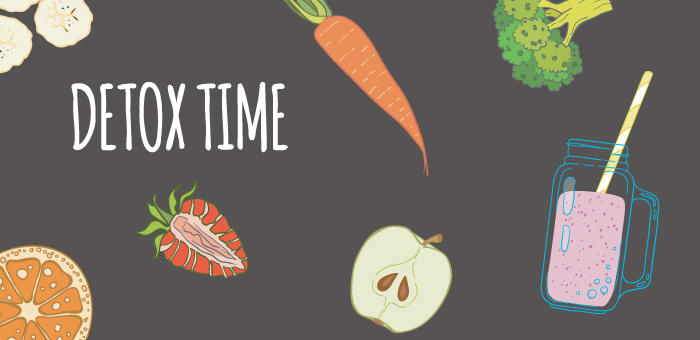Daily Detoxing – Dietary Tips

The body is detoxing and cleansing all the time. The liver, kidneys, lymph, bowels and skin all work together to detoxify and eliminate what is not needed. However, the festive season may have put an extra burden on these organs making January a good time to get back on track with healthy diet and lifestyle intentions and to up the ante on the lifestyle practices that cleanse the body.
A detox generally involves avoiding challenging and low nutrient foods whilst increasing the intake of nutrient rich, easy to digest, cleansing foods in order to support detoxification and healing. However, by following these daily detox tips there may be less need to “go on a detox” or, if you do an occasional cleanse, following these daily practices will make it much easier.
See also blog post on Daily Detoxing – Lifestyle Tips
1. Stay hydrated – fluids are hugely important for many aspects of body function, not least detoxification and elimination. Good ways to hydrate include water, freshly pressed vegetable juices, ginger, tea, lemon water, herbal teas and dandelion coffee.
2. Eat your fluids – eating foods with a high water content can also have a cleansing and hydrating effect. Fruits, vegetables, smoothies and soups all have a high water content.
3. Eat organic – organic foods contain fewer pesticide residues and are often higher in nutrients.
4. Eat your greens – green foods are rich in nutrients, fibre and chlorophyll all of which can help with detoxification and elimination. Examples include kale, broccoli, Brussels sprouts, cabbage, chard, lettuce, watercress, lamb’s lettuce and rocket.
5. Get fermenting – fermented foods can help to increase the diversity of organisms in the gut with potentially wide ranging benefits to health. Fermented foods to try include kimchi, sauerkraut, kefir, yoghurt, sourdough bread and kombucha.
6. Get sprouting – sprouting increases the nutrient content and digestibility of many foods. Good foods to sprout include green lentils, mung beans, chickpeas, alfalfa and broccoli seeds.
7. Fibre – fibre is the indigestible part of carbohydrates. What is indigestible to us may provide food for the gut microbes as well as providing a vehicle by which toxins can be removed from the body. Sources of fibre include whole grains, pulses, fruit, vegetables, chia seeds, flax seeds and slippery elm powder.
8. Sea vegetables – these are fantastically rich in minerals including iodine needed for thyroid function and metabolism. Use nori sheets to make sushi by wrapping up rice or vegetables with almond butter. Sprinkle kelp flakes onto soups, salads and grains. Add wakame or kombu to pulses while cooking to aid digestion.
9. Spice it up – herbs and spices can enhance digestion and provide antioxidants for the immune system as well as having antibacteral and antifungal properties. Include turmeric, cumin, coriander, ginger, fenugreek, basil, mint, fennel, dill, cinnamon, cloves, garlic and star anise.
10. Super foods – whilst all whole, natural foods are super foods in their own way there are some that are worth a mention and these include blueberries, goji berries, cacao, maca, mulberries, broccoli sprouts and slippery elm powder.
11. Relax when eating – the digestive system only works when the body is in a relaxed state. Eating under stress can lead to malabsorption and food sitting in the digestive tract for longer than is healthy. Take some deep inhalations and full exhalations before eating. Leave the technology in another room and eat mindfully and with gratitude.
12. Focus on things to include in your diet rather than things to avoid and go for those that you enjoy.
Always check with your doctor or medical specialist before embarking on any dietary or lifestyle changes, especially if you have a medical condition, are on medications or are pregnant or breast feeding.